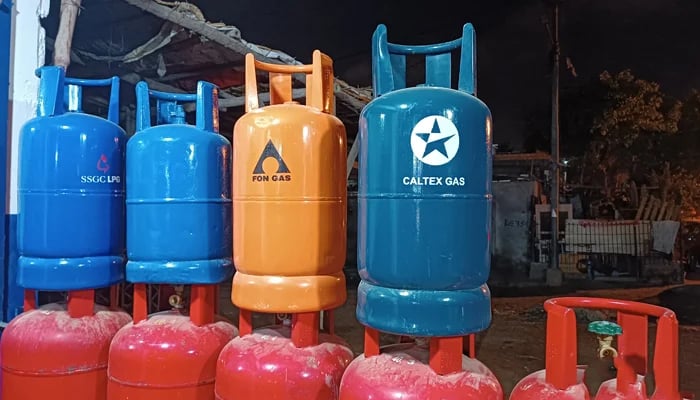Industries reject gas price hike, warn of economic fallout
SAI president says business community was given assurance for 9 cents per KWh electricity tariff by caretaker govt
KARACHI: Industrial associations on Friday rejected a hike in gas tariffs approved by the caretaker government, saying it would hurt the already struggling sector and lead to more closures and job losses.
The SITE Association of Industry (SAI) and the Korangi Association of Trade & Industry (KATI), representing the two largest industrial zones in Karachi, demanded that the government withdraw the decision and lower the gas prices to make them regionally competitive.
Muhammad Kamran Arbi, president of SAI demanded that the caretaker Prime Minister Anwarul Haq Kakar, Federal Minister for Commerce, Industries & Production Gohar Ejaz and Minister for Energy Muhammad Ali take back the decision of the hike in gas tariff in the larger interest of the national economy and to save the industries from collapse. "In case the decision is not withdrawn, the industries will close down, resulting in a decline in exports and mass unemployment," Arbi said in a statement.
The SAI president said the business community was given an assurance for 9 cents per KWh electricity tariff by the caretaker government. "However, contrary to the assurance given, POL, electricity and gas tariffs have been increased constantly by the caretaker government."
Arbi said the national economy is passing through a severe crisis currently, and running an industry is no more a profitable business. “Unfortunately, the caretaker government has taken no step to provide a competitive environment to industries, lower the cost of production and reignite the engine of the national economy, which has left the industrial community in despair.” Arbi remarked.
The asked the caretaker government to review the decision of the hike in gas prices and reduce them taking into consideration the ground realities. "The utilities prices should be fixed after thorough consultation with stakeholders, and justifiable as well as regionally competitive so that industrial activities continue without a hurdle, which would ultimately have a positive impact on the national economy and exports. In case the gas tariff is not lowered, it will have a negative impact on the country’s exports."
The Korangi Association of Trade and Industry (KATI) also vehemently rejected the recent surge in gas prices, asserting that this decision poses a severe threat to the industrial sector, potentially leading to increased unemployment.
Johar Qandhari, president KATI expressed concern over the already elevated production costs in the region, rendering industrialists less competitive compared to their counterparts in neighboring countries.
Highlighting the industry's prior demand for a reduction in gas prices from Rs2,100 to Rs1,800 per MMBTU, Qandhari underscored that the recent government decision to raise prices to Rs2,700 to Rs2,900 per MMBTU intensifies the challenges faced by the industrial sector.
The KATI chief warned that the continued escalation of gas prices could result in the closure of numerous industries, amplifying unemployment rates and diminishing Pakistan's export capabilities and appealed to the government to reverse this decision promptly and establish a fixed gas price of Rs1,800 per MMBTU for industries.
Emphasizing the need for the government to explore and provide affordable energy alternatives for the industry, Qandhari stressed that such measures are crucial for ensuring the competitiveness of Pakistani products the global market. As the industrial sector grapples with the ramifications of the gas price hike, President Johar Qandhari's stance advocates for the preservation of industrial stability and the prevention of potential economic setbacks for Pakistan.
-
 Jennifer Garner Drops Parenting Truth Bomb On Teens With Kylie Kelce: 'They're Amazing'
Jennifer Garner Drops Parenting Truth Bomb On Teens With Kylie Kelce: 'They're Amazing' -
 AI Is Creating More Security Problems Than It Solves, Report Warns
AI Is Creating More Security Problems Than It Solves, Report Warns -
 'Game Of Thrones' Prequel 'A Knight Of The Seven Kingdoms' New Ratings Mark Huge Milestone
'Game Of Thrones' Prequel 'A Knight Of The Seven Kingdoms' New Ratings Mark Huge Milestone -
 Apple Seeks To Dismiss Fraud Suit Over Siri AI, Epic Injunction
Apple Seeks To Dismiss Fraud Suit Over Siri AI, Epic Injunction -
 Delroy Lindo Explains The Crucial Role Of Musical Arts In Setting Up His Career Trajectory
Delroy Lindo Explains The Crucial Role Of Musical Arts In Setting Up His Career Trajectory -
 Timothée Chalamet Reveals How He Manages To Choose The Best Roles For Himself
Timothée Chalamet Reveals How He Manages To Choose The Best Roles For Himself -
 Princesses Beatrice, Eugenie’s Conflict Gets Exposed As Mom Fergie Takes Over The Media
Princesses Beatrice, Eugenie’s Conflict Gets Exposed As Mom Fergie Takes Over The Media -
 Kate Middleton Plays Rock-paper-scissors In The Rain
Kate Middleton Plays Rock-paper-scissors In The Rain -
 Lindsay Lohan On 'confusing' Teen Fame After 'Mean Girls': 'I Should Have Listened To My Mom And Dad'
Lindsay Lohan On 'confusing' Teen Fame After 'Mean Girls': 'I Should Have Listened To My Mom And Dad' -
 Savannah Guthrie Mom Update: 'Today' Show Sees Huge Ratings Boost Amid Search For Nancy Intensifies
Savannah Guthrie Mom Update: 'Today' Show Sees Huge Ratings Boost Amid Search For Nancy Intensifies -
 Hillary Clinton To Testify In Epstein Probe Alongside Bill Clinton
Hillary Clinton To Testify In Epstein Probe Alongside Bill Clinton -
 Meghan Markle, Prince Harry End Jordan Trip With Meaningful Hospital Visit
Meghan Markle, Prince Harry End Jordan Trip With Meaningful Hospital Visit -
 AI Boyfriends Gain Popularity In China As Young Women Turn To Virtual Romance
AI Boyfriends Gain Popularity In China As Young Women Turn To Virtual Romance -
 Prince William Receives Reality Check As His Media Strategy Fails
Prince William Receives Reality Check As His Media Strategy Fails -
 Zach Braff Reflects On Doing Odd Jobs Ahead Of Major Career Breakthrough In 2001's 'Scrubs'
Zach Braff Reflects On Doing Odd Jobs Ahead Of Major Career Breakthrough In 2001's 'Scrubs' -
 Google Rolls Out Nano Banana 2 With 4K AI Image Generation
Google Rolls Out Nano Banana 2 With 4K AI Image Generation




